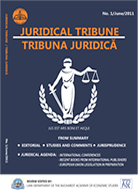The revision of the Posting of Workers Directive and the freedom to provide services in EU: towards a dead end?
The revision of the Posting of Workers Directive and the freedom to provide services in EU: towards a dead end?
Author(s): Sónia de CarvalhoSubject(s): EU-Legislation
Published by: Societatea de Stiinte Juridice si Administrative
Keywords: Directive (EU) 2018/957; posting of workers; freedom to provide services; European Union;
Summary/Abstract: The development of the internal market, based on the principle of freedom to provide services, as stated in article 56 TFEU, rendered common the posting of workers to another EU Member State. The risk of leading to social dumping in the host Member State, resulting from the less favourable working conditions of the sending Member State, justified Directive 96/71/EC. Collective bargaining, which has always taken on a prominent place in the posting of workers framework provided for in Directive 96/71/EC, is clearly reinforced by Directive (EU) 2018/957 that amended Directive 96/71/EC. The caselaw of the CJEU, however, has revealed that in some cases the enforcement of the host Member State working conditions, in view of the lack of harmonization of labour law in the Member States in relation to minimum protection mandatory rules, can paradoxically constitute a restriction on the freedom to provide services. The analysis of the amendments introduced by the Directive (EU) 2018/957 will demonstrate that, despite creating a favourable legislative framework for fair competitive conditions between national undertakings and the undertakings that post workers, may compromise the delicate balance between the protection of workers and the freedom to provide services.
Journal: Tribuna Juridică
- Issue Year: 8/2018
- Issue No: 17
- Page Range: 719-733
- Page Count: 15
- Language: English

